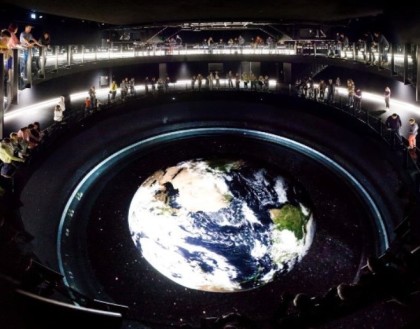Filed under: Directions for Sustainable Innovation, Laws and Public Interventions, Sustainability News | Tags: earth, Entrepreneurship, Environmental Impact, Innovation, Science, Space, Systems
This summer I visited with my daughters the movie ‘Earth- Our Planet, Our Home’ in the Colombus Earth Center in Kerkrade (The Netherlands). The movie offers a spectacular insight in the life of astronauts:
How are astronauts preparing for their time in space? How do they experience to live in space and view the Earth from above? And what are their reflections once returned at Earth?

Dutch astronaut André Kuipers shared his epiphany moment when he looked down at Earth from space. ‘You realise it is just one Earth that is suitable for us as human beings. Forget about Mars or the Moon: This is the only possible habitat in the whole universe. He continues “We have to rethink energy consumption, food production and cities to allow for 10 billion to live in dignity on this planet’.
To me it is clear: To redesign our energy and food systems, the built environment and more, we will need ‘all hands on deck’. All ‘métiers‘ are needed to make the new systems sustainable, socially just ánd desirable. It is up to all of us, as designers, urban planners, sociologists, economists, data-experts, marketeers, scientists, film makers, architects, accountants, politicians, biochemists, social workers and artists to co-create this new world we would love to live in. (-60% of the cities by 2030 are still to be build yet so we better design them prepared for the future).
Where to start? First: Become a very good designer, urban planner, sociologist, economist, or any other profession. But then: Question your current frameworks and theories: Are they suitable for future proof systems? If not: Find out who is already starting in your domain to (re)design frames, learn more, question and join forces.
A number of new initiatives have emerged in recent years that give some directions. Think about the United Nations Sustainable Development Goals. A call for action to improve the lives of many by 2030 in 17 goals. Another source of inspiration is Kate Raworths’ thinking on the ‘Doughnut Economy’. Raworth rewrites the rules of economy: Our current focus on GDP should be replaced by a focus on the global economy operating in the safe and just space in which everyone enjoys basic social standards and we stay within planetary boundaries. And don’t forget Sir Ellen McArthur who explains to everyone who wants all about the circular economy, as well as Delft University Associate Professor Conny Bakker who developed with her colleagues very le concrete guidelines for circular product design: ‘Products that last’ . Take also the Milano Mayor, Giuseppi Sala for example, who puts into practices that ‘cities can be the trigger for food system change, reduce emission, ensure social inclusion and consumer behaviour change’. Also to be followed is the ‘Food Reform for Sustainable and Health ‘FReSH’ coalition : 37+ businesses and scientists who are determined to identify necessary dietary switches for people and planet and come up with business solutions that suit future proof food systems. Many more examples are out there, just learn, experiment and share what works!
My daughters have not decided yet if they want to be an astronaut or architect (I would be very happy with all choices) but I hope they will continue to be curious and see opportunities to make a better world for all – building on the new insights of many.
Have a happy and relaxed Christmas time with your family and friends – and a great new year. Be curious, be bold, be brave!

Filed under: Best Practices in The Netherlands | Tags: Critical Factors, Definitions, Entrepreneurship, Innovation Processes, SME, Sustainable Innovation
Not only the large companies, but also Small and Medium Sized Companies (SMEs) may very well profit from sustainably innovation. It increases competative advantage, reduces (production) costs and improves social and environmental impact.
Hilke Bos-Brouwers, of the ‘Vrije Universiteit’ in Amsterdam in The Netherlands, recently presented theses conclusions of her PHD research.
Based on her extensive research among 1056 Dutch SME companies (< 250 employees), Mrs Bos-Brouwers concluded that SMEs innovate in a sustainably way, but slightly different as compared to larger entreprises. Innovations are often incremental, very pragmatic and type of innovation can vary per industry sector.
Hilke Bos-Brouwer has identified seven critical factors that, significantly contribute to the success of sustainable innovation in SMEs : (1) Obligations, (2) Trained employees (3) Suppliers (4) Industry groups (5) Degree of formalisation (6) Customer (needs) (7) Government.
Bos-Brouwer also brings up a list of (partly new) and definitions that may be helpful. Some of them translated in English :
- Sustainable Development : development that meets the needs of the present without compromising the ability of future generations to meet their own needs (definition Commission Brundtland, 1987).
- Sustainable Entrepreneurship : integrating environmental, social and economical aspects in the core business of the company, on a volontairy basis, whereby stakeholders needs and supply chain cooperation is regarded key to improve the company results on the short and middle term.
- Innovation : renewing or improving products, services, technical and organisational processes or marketing strategy ; the novelty of the innovation can be related to the industry sector or market.
- Sustainable Innovation : renewing products, services, technical, organisational processes or marketing strategy in such a way that the economical performance as well as the environmental impact and the social impact, on the short and the long term, are taken into consideration, .
- Sustainable Innovation Processes : decision making, design and implementation processes that guide sustainable innovation projets
Sources : (1) http://www.stichtingmilieunet.nl/andersbekekenblog/duurzaam/duurzaam-innoveren-winstgevend-voor-mkb-by-hilke-bos-brouwers.html and (2) press release [PWC-MEDIA] ‘Persbericht VU – Duurzaam innoveren winstgevend voor MKB’, 3 september 2010, Free university of Amsterdam